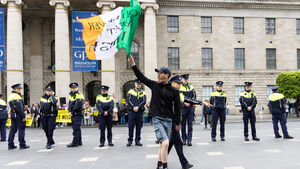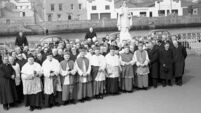It's time we started valuing our politicians

An anti-immigration protester is moved away from a counter-protest by a Garda officer outside the GPO Museum, Dublin. Picture: Evan Treacy/PA Wire
Why would anyone want to be a politician in Ireland? The late John Kelly, a Dublin TD and UCD academic, once justified his own obsession with politics by suggesting it originated out of a desire to serve his country. And then added that, on reflection, he could have done that just as well by joining the St Vincent de Paul!
Whatever the reasons offered to explain the grip of politics, it’s probably, not unlike golfing, a form of disease that’s somewhere between a life-long passion and a permanent addiction. Politicians, like golfers, are dreamers who imagine that one day some extraordinary achievements are not beyond them and that heading the poll or winning the British Open will open up undreamt of possibilities for success or admiration and possibly fortune. And in wind or rain, on good days and bad, supported or reviled, they ply their trade regardless of result or reason.
Where politicians differ from golfers is that whatever the results in the short or long term of their commitment to their chosen passion/addiction, while there is something inescapably self-centred and self-absorbing about the golfing malaise, the politician’s drive is fundamentally communitarian.
Indeed it can be said that while we in Ireland can sit back and enjoy life in a society with a truly democratic impulse, we don’t always appreciate the politicians who make it possible. Their achievement is ultimately nothing less than personally contributing to and sustaining – sometimes over the course of a lifetime – the most successful, liberating and productive political system yet devised – democracy – and all of us are in their debt for that fundamental service. (And if that doesn’t make sense to you, you haven’t read the 2023 Booker Prize winner, by Paul Lynch).
Politicians do the work and we sit back enjoying the fruits of their labour, sometimes even giving ourselves credit for going to the bother of voting (and sometimes to our shame not even doing that) while we criticise, blame, abuse, demean, excoriate the very agents of our democratic order and the free and fair elections that now are a fundamental part of our culture.
It’s grotesquely unfair, we know, and yet negativity towards our politicians is embedded in Irish society and we easily succumb to the national pastime that it now represents. It’s unfair and untrue what the hob-commentators trot out as definitive: politicians are only in it for the money; corruption is widespread; shady dealings are par for the course; and so forth.
Relatively speaking, politicians are generally not well paid for what they do. And the proof of that particular pudding is that most people are not prepared to do what politicians do to earn the money that they earn. How many of the hostile commentators are prepared to put their names forward for election?
Very few – because they know too much about it! They know that they would have to depend on the goodwill of their constituents to gift them their job every few years. That they would have to put up with people calling to their homes at all hours of the day and night. That they will be criticised if they are not always locally available and if they don’t spend enough time in the Dáil. That either way they will spend much of their time responding to conflicting and impossible expectations and living with the knowledge that at every turn they are the butt of often personal criticism and scathing comment. Little wonder that so many of them can’t take it and decide to throw in the towel.
Adding to the unease of politicians with growing levels of complaint and abuse is the growing practice of submitting public representatives at public gatherings to the vilest of personal abuse. People who have made absolutely no contribution whatever to public service can feel entitled – simply by their presence at a meeting – to inflict on those who have given a lifetime of public service anything from the ritual abuse of a county councillor to congregating threateningly at An Taoiseach’s private home.
It’s a weird sense of citizen entitlement that, regardless of intelligence or common sense, individuals (simply because they turn up at a meeting) presume they can bully, condemn, defame and threaten public servants at will. All they need is a microphone and a gathering of similarly gullible and impressible individuals that make up a predictable cocktail of climate deniers, anti-immigrants, conspiracy theorists, alternative medicine freaks, far-right activists, refugee bashers, religious extremists and chancers – as well as enough Tricolours to convince the credulous that wrapping themselves in the green, white and gold will provide the kind of credibility that will give them an added status.
That campaign needs to be named for what it is: a populist attempt by a consensus of the disgruntled and the disaffected to bulldoze aside the best of what we can be as a people in a selfish effort to maximise their own personal resources.
We can be better than this – as we know from our recent and not so recent history – from Jack Lynch and Liam Cosgrove to Leo Varadkar and Micheál Martin and others – an honourable gallery of Irish political figures who have given witness to standards of which as a nation we can be justly proud. It is a tradition embedded in doing the right thing for the right reason rather than demanding preference for ourselves regardless of the consequences of others.
Three upcoming elections will indicate who we value as a people – fly-by-night opportunists who imagine they are God’s gift to politics or the real politicians who will be there to pick up the pieces and to sustain our still fledgling democracy after just more than a century.




